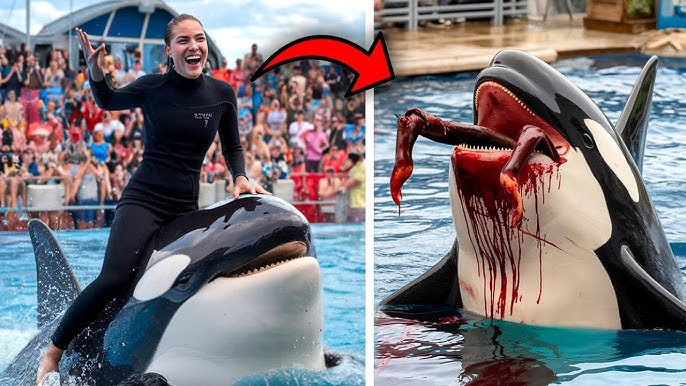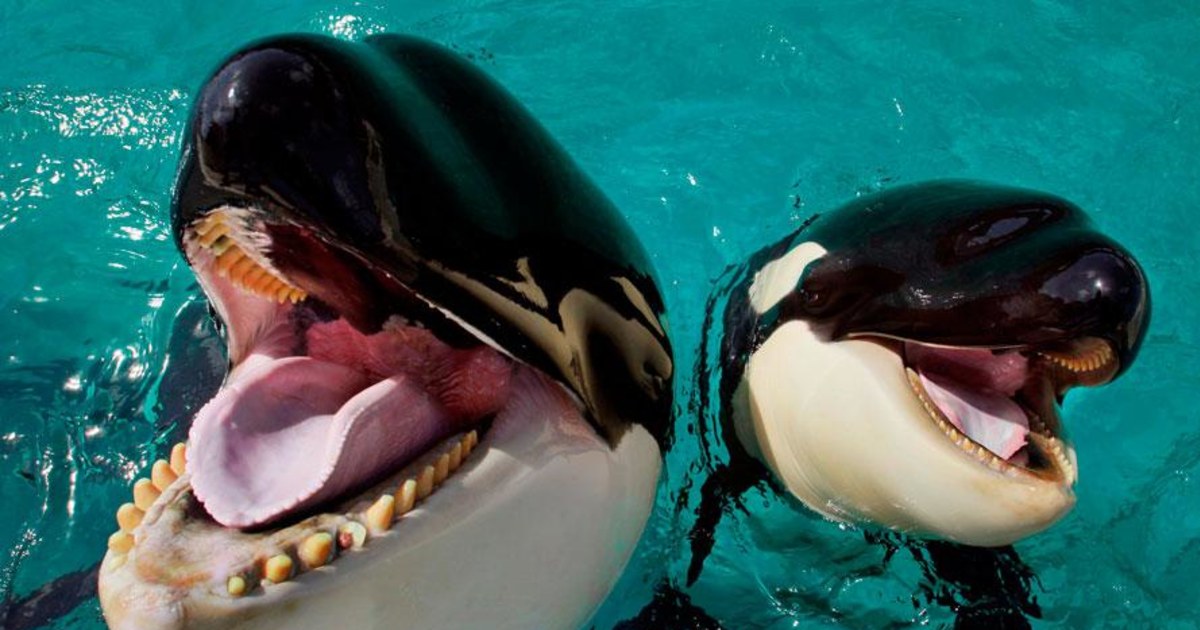The marine entertainment world was shaken by a devastating incident at SeaWorld that left families, staff, and animal lovers in disbelief. During what was expected to be a routine orca performance, a 41-year-old seasoned trainer tragically lost her life in front of a live audience. The horrifying event unfolded in mere seconds, turning a day of joy and education into one of the darkest moments in SeaWorld’s history.
Witnesses report that the show began as usual, with music, narration, and choreographed movements between humans and orcas. The victim, a senior trainer with over 15 years of experience working with marine mammals, was known for her deep bond with the orcas—especially with one specific killer whale who ultimately turned on her. Spectators, including families with children, were left traumatized as the orca dragged the trainer underwater during the performance. Screams filled the stadium, and panicked parents rushed to shield their children’s eyes from the terrifying scene.

Emergency services were immediately called, and SeaWorld staff did their best to clear the area and provide aid. Despite their efforts, the trainer was pronounced dead shortly after the incident. The orca involved was one of SeaWorld’s most well-known and had been part of dozens of shows over the years. Initial investigations suggest the killer whale may have exhibited signs of distress or agitation prior to the performance, although this has not yet been officially confirmed.
Experts in marine animal behavior have long warned about the risks associated with keeping large, intelligent creatures like orcas in captivity. Orcas, also known as killer whales, are highly social and emotionally complex animals. In the wild, they swim up to 100 miles a day and live in tight-knit family groups. Critics argue that the confined environment of marine parks can lead to unnatural behavior, stress, and even aggression toward both other orcas and human trainers.
This incident has reignited a heated debate over the ethics of marine life entertainment. Animal rights organizations were quick to respond, with many calling for an immediate end to orca shows and the phasing out of captive marine mammals altogether. The tragedy echoes previous incidents in which captive orcas have been involved in trainer injuries and fatalities, underscoring the inherent dangers of these interactions.

SeaWorld released a statement expressing deep sorrow over the loss of one of their most experienced team members. They extended condolences to the trainer’s family and pledged to fully cooperate with authorities during the investigation. The park has temporarily suspended all orca shows and interactive experiences while a comprehensive review of safety procedures is conducted.
In the days following the tragedy, tributes have poured in from colleagues, friends, and guests who had seen the trainer in action. Known for her passion, empathy, and professionalism, she was described as someone who truly loved the animals she worked with and dedicated her life to marine education and conservation. Her sudden death has left a void not only at SeaWorld but also in the wider community of marine biologists and trainers.
Public response has been mixed. Some defend SeaWorld’s mission of conservation and education, pointing to the organization’s breeding programs and research contributions. Others believe the risks simply outweigh the benefits and argue that it is time to evolve past live-animal entertainment. Online petitions calling for the retirement of orcas in captivity have gained tens of thousands of signatures in just a few days, and social media platforms are filled with emotional messages mourning the trainer’s death and questioning the future of marine parks.
In response to the incident, several lawmakers have voiced support for reviewing legislation related to the captivity of large marine animals. Some have proposed new regulations that would prohibit breeding or acquiring new orcas, while others call for a complete ban on performances involving marine mammals. These developments may influence future industry standards and policies in the United States and beyond.
As the investigation continues, SeaWorld faces immense pressure not only from the public but also from regulatory bodies. The Occupational Safety and Health Administration (OSHA) and other agencies are expected to conduct a thorough review of the park’s safety protocols, trainer guidelines, and animal welfare practices. Their findings could determine the fate of SeaWorld’s flagship shows and significantly reshape public interaction with captive marine life.
The tragedy serves as a sobering reminder of the unpredictable nature of wild animals, no matter how well-trained they may appear. It has also become a pivotal moment for reflection on the balance between entertainment and ethical responsibility. While marine parks have long aimed to inspire awe and respect for the ocean’s creatures, the death of a beloved trainer has cast a dark shadow over the practice.
Families who attended the fateful show may never forget the horror they witnessed. For many, what was meant to be a magical experience turned into a traumatic event that sparked serious questions about animal captivity, human safety, and the future of marine-based attractions. As the world watches how SeaWorld and regulators respond, one thing is certain: this heartbreaking incident has changed the conversation around orca shows forever.




